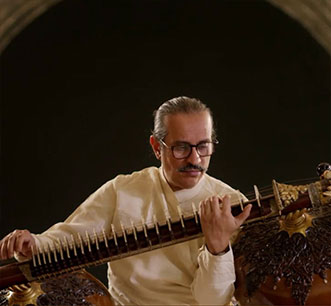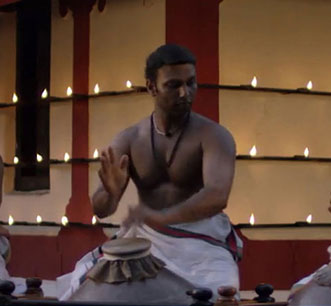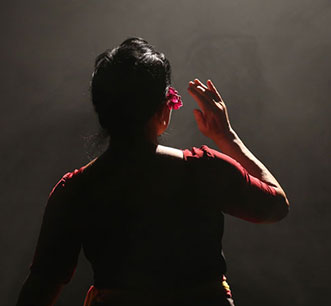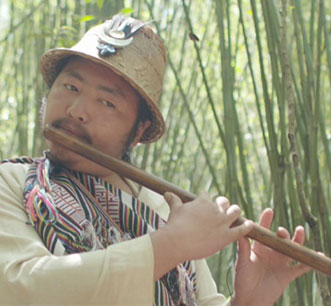Harmony with A. R. Rahman
'A.R Rahman's Harmony' is a curated exploration of the past and future of Indian music
through the eyes of A. R. Rahman. India's rich musical heritage is viewed through the prism of four
specially curated instruments and vocal traditions, selected in order to represent the geographic and
historic diversity of the country. The series will examine the traditions, the musicians and the
locations.
THE TRADITION
- Rudra Veena: An ancient classical plucked string instrument from North India, with an
unbroken musical lineage since its creation until the present.
- Mizhavu: A sacred drum from the temples of Kerala. It's made from a large metal drum
and normally performed as an accompaniment for Koodiyattam.
- Panthong Palith: A wooden flute from Sikkim, played by the Lepchas in order to
communicate with the gods.
- Khuilang Eshei A vanishing folk song tradition from Manipur, with distinct identity and
vocal technique.
Over the course of the series, the role of these historical (and slowly dying) instruments and
musical traditions in modern Indian music cultures is re-examined and re-contextualized by A.R
Rahman. The series will also focus on the beautiful craftsmanship of the instrument itself.
Conversing with the instrument makers provides a view of the intricate and artistically challenging
process that goes into the construction and maintenance of the instruments.
A.R Rahman travels across the Indian subcontinent to meet each of the musicians and
experiences their particular tradition in its original context. As the musicians live their day-to lives:
practicing, performing and teaching their students they show audiences what it means to keep such
traditions alive in the 21st century.
THE MUSICIANS
Baha'un-din Dagar
Baha'un-din Dagar comes from an eight generation-long lineage of musicians who play the Rudra
Veena in the Dhrupad style. His father Ustad Zia Mohiuddin Dagar was a legendary player and
world-renowned expert on the Rudra Veena. Bahauddin grew up in suburban Mumbai, surrounded
by art and music. He started learning the rudra veena under his father at age 12. When his father unexpectedly passed away in 1990, Dagar found himself the sole heir of the Dagar Vani style of
Dhrupad played on the Rudra Veena. Aware that he has a responsibility to carry forward the
Dhrupad tradition, Dagar teaches at the Dhrupad Gurukul at Palaspe near Panvel that was
established by his father. He firmly believes that teaching is integral to his own learning and growth
as a musician. For him this search is limitless.
Sajith Vijayan
Sajith Vijayan has lived his entire life in Thrissur, Kerala. Having begun his training in the
Mizhavu in the eighth standard at the Kerala Kalamandalam, Sajith has devoted a majority of his
life to the Mizhavu. Sajith's interest in the Mizhavu stemmed from his fascination for the various
dramatic art forms that the Mizhavu accompanies, such as Chakkiyar Koothu and Koodiyattam.
Though originally trained in both art forms, he now identifies as a percussionist. He strongly
believes that drumming requires scientific knowledge of the story, rhythms and mathematics. He is
at present a teacher and drummer for the Kalamandalam. Sajith has collaborated with other
contemporary musicians, and most recently was a percussionist for the contemporary theatre
performance 'The Kitchen'.
Lourembam Bedabati Devi
Lourembam Bedabati Devi of Chingamakha Yanglem Leikai, Imphal is a renowned artiste
and guru of traditional Manipuri folk song known as Khunung Eshei or Khuilang Eshei. Growing
up in the village of Seijang she felt deeply connected to the landscapes and cultures of rural
Manipur. She learned under several revered gurus including Guru Mangoljao, Guru Khonang, Guru
Nungshi Devi, Gum Maibarn Tomba and Gum Nodia. Having acquired a vast repertoire of practical
and theoretical knowledge, she successfully embarked on a mission of popularising folk music.
Bedabati Devi believes in exploring her creativity without compromising on the traditions from
which the art form comes. Apart from being a popular performer, she is also recognised as a guru
who has produced more than twenty artistes of traditional folk song and dance. She seeks to make
khulung eshei available to younger generations of the Meitiei people, while still retaining the
original sound of the music.
Mickma Tshering Lepcha
Mickma Tshering Lepcha grew up in West Sikkim, in the village of Nehrdhang Busty
surrounded by music: his father, a shaman, performed the ceremonial chanting that many believe to
be the basis of Lepcha music, and Mickma's sisters and brothers would often sing as they did their
daily chores. He began formal training in music after he moved away from home to pursue his
education. He began to train under Padma Shri awardee Mrs. Hildamit Lepcha his first instrument
being the stringed thungbok. He began to learn the pangthongpalit at age 27 after hearing it being
played by his uncle. He was swayed by the particular sound the flute made and the associations to
nature and Lepcha culture it brought with it. Around 2011, he came together with his brothers and a
few other musicians who wanted to form a fusion band and formed Sofiyum, who use Lepcha
melodies in more contemporary compositions. Mickma's ultimate goal is to travel and teach the
pangthongpalit as widely as possible- he knows that he alone cannot stand against the tide of a
dying tradition, but he hopes that by passing on the instrument, the music will live on.
THE LOCATIONS
The series takes place across four different locations:
- The busy streets and neighborhoods of Mumbai as Dagar takes us through his life as a classical
musician in the 'first' modern city of India. He shows us how he has created a space of serenity for
the veena within such bustle ;
- The lush locals of Trissur, Kerala, where Sajith shows us the importance of artistic havens and
serene spaces;
- The lofty mountains of Sikkim, where Lepcha music has been made for centuries, and Mickma
hopes, will be made for centuries to come;
- And the rolling hills of Manipur, that Bedabati Devi considers beautiful enough to have inspired
a musical legacy.
Along with the instruments and musicians each of these locations is explored in detail, as
the series attempts to transport audiences to the homes of these various musical styles.
FINALE
Through the series, A.R. Rahman uses the knowledge he has gathered to begin composing a
piece of music that uses the distinctive qualities of these musical traditions in an ensemble. This
episode will see all the various characters coming to Chennai to work together. The interaction and
collaboration of the various musicians and the intermingling of their traditions will be the highlight
of the final episode of the series which will conclude with a grand performance of the newly
composed piece of music.





